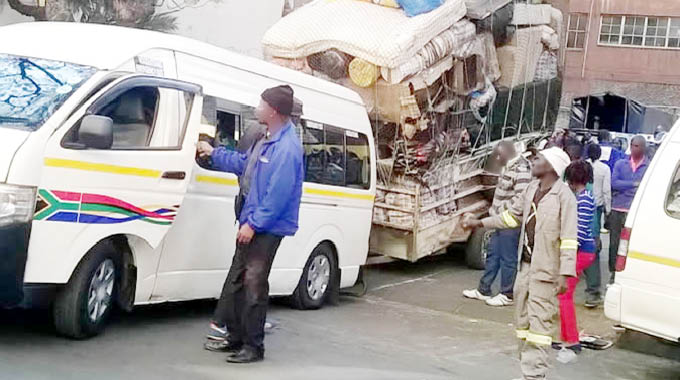Omalayitsha feel Covid-19 pinch

Mthabisi Tshuma, Showbiz Correspondent
IT’S a Tuesday morning and Dennis Dube, popularly known as Ndlesto, is basking in the sun gazing at the pride of his life, a spotless Quantum that is parked at a car park in Emakhandeni suburb.
No joy comes from looking at an asset that was once a cash cow for Dube, his family, colleagues and former employees.
Gone are the days that Ndlestos would every Tuesday morning, leave Bulawayo for South Africa with a handful of passengers and come back two or three days later with his Quantum and trailer full.
His presence in the city would create jobs for up to 10 people contracted to help in delivering the goods and passengers to their final destinations, some as far as Dlamini Village in Tsholotsho, Makhulela Village in Bulilima and Mapate Village in Gwanda.
The effects of the lockdown which has brought with it, closure of the South African and Zimbabwean border posts has left omalayitsha (cross-border couriers) shaken, stranded and hopeless.
Narrating his ordeal to Saturday Leisure, Ndlestos said he has become clueless on how to survive this pandemic as he has two homes, one in Zimbabwe and the other in South Africa which he needs to run.
“The pandemic has greatly affected us in every way as we do not have an alternative way to put food on the table. As omalayitsha, we’re one group that due to the lockdown, has no Plan B at all.
“We have two places where we’re paying rent (Zimbabwe and South Africa) and the landlords want their money without fail so it’s really stressful,” said Ndlestos.
Also, most omalayitsha do not fully own the vehicles, mostly purchased in SA, they are paying for them in instalments. This also, according to Ndlestos, is another headache that is causing them sleepless nights as they are failing to raise the funds to pay banks.
As a result, most omalayitsha are now at loggerheads with SA banks.
“The challenge we have now is that most of the cars that we use are owned by banks and we pay in instalments. But how does one pay for a car that isn’t even making money for them?
“Our only hope is that the Government ropes us in to also transport essential cargo as we’re starving,” said Ndlestos.
Other cross-border transporters, the likes of Joseph Mahalis from Emvalweni village in Plumtree, realising they were in a fix, have found other means to make money using their vehicles.
Mahalis simply said “ukukhala akusizi” meaning complaining will not fix the situation.
He said he has turned his vehicle to a mushikashika (pirate taxi) where he transports villagers from rural Bulilima to Plumtree town. “I cannot just sit and do nothing honestly as everyone at home looks up to me.
This is why I’ve had to stand up and start working illegally. I know I may face jail time, but there’s no other option as the priority now is to feed my family,” Mahalis said.
In a snap survey during the week, it was observed that omalayitsha are ferrying goods and passengers to and from rural areas that include Tsholotsho from Emakhandeni Emagetsini.
This is how some of them have resorted to making ends meet although they are defying the lockdown rules as private commuter operators have not been authorised to operate during the lockdown.
Other stranded omalayitsha have also gone an extra mile to remove seats from their vehicles so as to ferry farm produce that includes water melons to the market places in the city.
Since trucks are permitted to transport goods into the country from South Africa, some omalayitsha are said to have ditched their Quantums and are now using trucks. — @mthabisi_mthire.











Comments